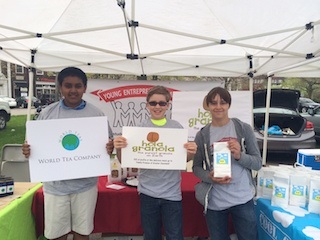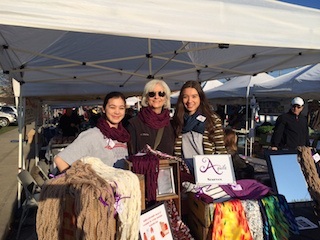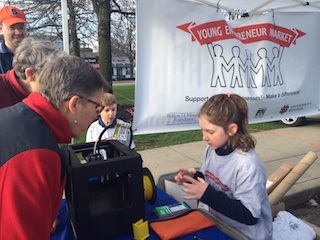Over the past ten years I have seen an enormous effort to reject the big chains in favor of the small business and with this movement, the rise of the market. Near my old apartment in the West Village, every weekend brought more farmer's markets, organic fruit and vegetable markets, craft and artisanal markets, and a new kind of flea market. These days, in Princeton the local markets are a beautiful way to spend my afternoon and get to know more small business people.
The movement away from big retailers towards local entrepreneurs is a good one. It benefits the consumer because as the market grows, the consumer has more choices--to buy locally grown food, handmade products, or artisanal work once very difficult to find. And it benefits the entrepreneurial movement as well, since consumers now have more opportunity to support local artists, farmers and producers. I will write later about what I see as the coming Entrepreneurial Revolution, and how movements like this will play an important role, but for now, I want to hone in on one spectacularly unique and effective market--the Young Entrepreneur's market.
Last year, educators in Cleveland got together with one goal in mind: find a way to engage students in their education by encouraging them to explore business startup. The University School, a 125-year old school, partnered with the Veale and Morgan Foundation's to create the Entrepreneur Institute and the Young Entrepreneur Market. They found a permanent space for middle and high school students to sell their products by partnering with local outdoor markets. And in doing so, they have encouraged a whole new generation of young entrepreneurs in Northeast Ohio. I recently spoke to Greg Malkin, the founder and director of the Entrepreneur Institute, about how he got the program started and some of the initial successes they are seeing in the Market's first year.
University School middle school entrepreneurs sell their loose leaf tea, breakfast granola, and cake mixes.
Steve Mariotti: How did the Young Entrepreneur Market (YEM) start?
Greg Malkin: It was quite organic! So many of the teachers and educators we work with indicated that there is a need for students to experience selling face-to-face and to interact with potential customers.
Many schools and organizations offer some sort of entrepreneurship education. Students generate ideas, form teams, write business plans, and deliver pitches at competitions. Some schools even have the opportunity to sell to fellow students.
Yet there were few opportunities for students to sell to the public, to gain real-world experience.
SM: What are some of the initial successes?
GM: Partnerships were key to get the program off the ground, beginning with our two foundation partners. We then approached a core group of schools and identified lead partners within those schools who have a good grasp of their students' entrepreneurial activities. The program also partners with area farmers markets such as the North Union Farmers Market and the Hudson Farmers Market. They set up the YEM tent which can accommodate up to three student businesses. This way, our students can market their products to an existing community of potential customers who already value artisan products and the concept of buying local. The market shoppers are now asking, "Who is in the YEM tent this Saturday?"
Once the students were out in the community, they made wonderful connections: like the two students from Beaumont School who were selling hand-made infinity scarves. The Fabric Buyer at Jo-Ann Fabrics happened to see them and ended up offering them free fabric samples. During our first six months we had 20 Market Days, 29 student businesses, 44 student entrepreneurs and more than $4,000 in sales!
SM: So what are the students getting out of the experience?
GM: For the students, it is a thrilling learning experience. Many of them don't know what to expect or think their product will sell itself. It is their first time selling or their first time selling outside of the school. These are the first adult customer interactions they have and many of them end up taking orders and develop a customer following.
Finally, their idea that once existed only on paper turns into a reality. They are hooked and start to see entrepreneurship as a viable career choice. They have something that they own and can take charge of. They learn by doing: is my pricing right, what does my competition look like, did I break even? Next time they bring business cards, have a better display, and don't spend the first hour of the market sitting behind their table. They look at the world with a different eye: one mother whose son is selling granola said "He has far more of a discerning eye. We walk through the grocery store and he would say - I have to lower my prices" And that is pretty mature for a middle schooler.
Beaumont School entrepreneurs, with their teacher, get their business ready for the market. The students made a connection at the market and secured free fabric for their infinity scarves.
The shoppers say it is so cool. Seeing the student entrepreneurs at the market definitely makes them appreciate how hard it is to run a small business, even if it is just a simple food stand. They are more aware of entrepreneurship around them and the creativity behind the businesses. Some of the students from the Young Innovators' Society were selling products they designed and brought their 3D printer to showcase the process. Market shoppers that day could not only get their tomatoes but were able to see how a 3D printer works! And that really was so cool.
A Young Innovators' Society member explains to market shoppers how a 3D printer works.
SM: How do you imagine the program growing, given all the positive results you have see so early on?
GM: We definitely want to reach more schools and partner with more farmers markets. We are also raising awareness of youth entrepreneurship with a more ongoing opportunity to sell by building an online YEM to promote students' products and take orders.



